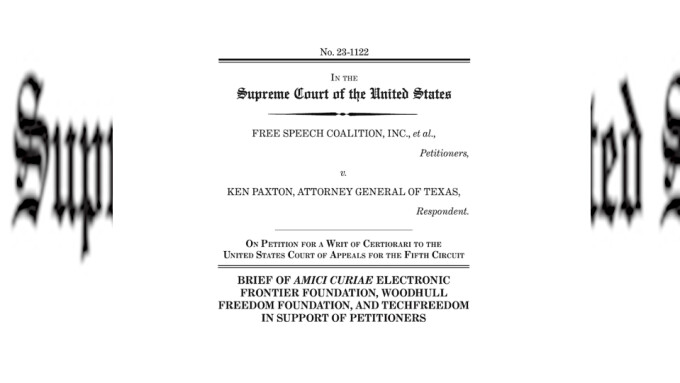WASHINGTON — Leading digital rights organizations Electronic Frontier Foundation (EFF), Woodhull Freedom Foundation and TechFreedom filed an amicus brief Monday supporting Free Speech Coalition (FSC) in the U.S. Supreme Court review of an appellate decision upholding Texas’ controversial age verification law.
As XBIZ reported in July, SCOTUS agreed to hear the FSC challenge to HB 1181, the age verification law passed by the Texas legislature. The law is a much-augmented version of Louisiana’s age verification law and its many copycat versions promoted by religious conservatives in other states.
HB 1181 was authored by Texas Attorney General Ken Paxton’s wife, state Sen. Angela Paxton, reportedly with input from pastor Mike Buster of the Prestonwood Baptist megachurch, to which the Paxtons belong.
At the time, FSC condemned the law as “blatantly unconstitutional” and a “violation of the First Amendment rights of creators, consumers and platforms.”
FSC filed the legal challenge in August 2023. Joining the FSC as co-plaintiffs are an array of adult platforms and workers, including MG Premium and MG Freesites, which are now Aylo companies; Webgroup Czech Republic; NKL Associates; Sonesta Technologies; Sonesta Media; Yellow Production; Paper Street Media; Neptune Media; Mediame; Midus Holdings; and Jane Doe, an adult content creator.
The EFF-led amicus brief was penned by industry attorneys and First Amendment experts Lawrence Walters and Corey Silverstein.
Silverstein told XBIZ that HB 1181 is “an unoriginal, unconstitutional attempt at speech suppression” and has been from the very beginning.
“Despite the fact that the 5th Circuit made a terrible ruling, the adult industry was not deterred and is being supported by various trade organizations that are committed to guarding first amendment principles,” Silverstein added. “This is a historical fight for free speech and I’m honored to be part of the legal team representing these courageous organizations.”
Woodhull released a statement explaining that the brief contends that HB 1181 “imposes unconstitutional burdens on adults’ right to access protected speech. Specifically, the law would force adults to sacrifice their privacy and anonymity in order to view legal sexual material online. HB 1181 will unconstitutionally chill, and in some instances entirely block, adult access to lawful online speech.”
Woodhull CEO Ricci Levy added, “Sexual freedom is a fundamental human right critical to human dignity and liberty. By requiring invasive age verification, this law chills protected speech and violates the rights of consenting adults to access lawful sexual content online. Courts across the country, including the U.S. Supreme Court, have consistently ruled that age verification requirements for accessing protected content are unconstitutional when less restrictive alternatives exist. This principle was reaffirmed in Ashcroft v. ACLU, where the Court held that protecting minors doesn’t justify imposing such burdens on adults. We support protecting children from inappropriate content, but this must be achieved through less intrusive means that preserve the rights of adults.”
Levy also thanked MojoHost for funding the brief, enabling the groups to present their arguments to the Supreme Court.
MojoHost CEO Brad Mitchell said, “I have tremendous faith in the wisdom of SCOTUS to determine the unconstitutionality of HB 1181 and to have the courage to strike down this bad legislation. It not only fails at its stated purpose of protecting minors, but it silences American voices while turning up the volume on the internet from every other corner of the earth without repercussion, bringing even worse material center stage.”








